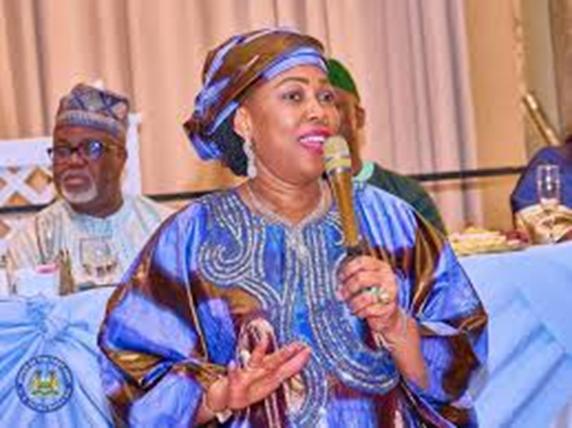By Mackie M. Jalloh
In a bold call for comprehensive women’s health reform, Sierra Leone’s First Lady, Dr. Fatima Maada Bio, has positioned uterine health as a critical issue for national development, human rights, and social equity. Speaking at a series of engagements aimed at advancing women’s reproductive wellbeing, she emphasized that conditions such as fibroids, endometriosis, and cervical cancer are not merely medical concerns but fundamental challenges that affect the dignity, economic participation, and social inclusion of women nationwide.
For decades, uterine health has remained a largely silent crisis. Millions of women, particularly in rural areas, suffer in isolation due to social stigma, misinformation, and limited access to quality healthcare services. The consequences extend far beyond individual health: untreated uterine conditions can impact fertility, disrupt families, reduce productivity, and hinder broader community development. Recognizing the urgent need for change, the First Lady has leveraged her platform to bring attention to this often-overlooked aspect of women’s health.
At the center of her advocacy is the Hands Off Our Girls Campaign, a signature initiative dedicated to protecting and empowering young women through education, access to healthcare, and social mobilization. While initially focused on combating sexual violence and exploitation, the campaign has evolved to encompass broader reproductive health issues, with uterine health emerging as a priority concern. By addressing the stigma surrounding gynecological conditions, the campaign seeks to create safe spaces for women and girls to speak openly about their health, access timely medical care, and receive accurate information.
Dr. Fatima Bio highlighted the importance of community-based partnerships in extending healthcare access to underserved populations. She praised organizations such as VillageReach, which employs innovative outreach strategies to deliver services and information to remote communities. “Real change begins at the grassroots,” she noted. “When we empower local structures and leverage partnerships, we can ensure that women in every corner of Sierra Leone are informed, supported, and protected.”
Her approach to uterine health is deeply aligned with principles of human rights and development. Dr. Fatima Bio emphasized that ensuring women’s reproductive wellbeing is not just a matter of medical intervention; it requires systemic action, including policy reforms, resource allocation, public education, and political commitment. She underlined the need for multisectoral collaboration, bringing together government agencies, civil society, healthcare professionals, and international partners to implement sustainable solutions that prioritize women’s health outcomes.
Under the First Lady’s leadership as President of the Organization of African First Ladies for Development (OAFLAD), uterine health has become a continental priority. Her advocacy is part of a broader vision to integrate maternal health, reproductive rights, and gender equity into national development strategies. By linking women’s health to economic productivity, social stability, and community resilience, she frames uterine health not as an isolated medical issue but as a strategic development concern.
Public health experts support this perspective, noting that conditions affecting the uterus are among the most under-discussed yet high-impact health challenges for women. Fibroids, for example, affect a significant proportion of women of reproductive age, causing pain, menstrual irregularities, and in severe cases, infertility. Cervical cancer remains a leading cause of cancer-related deaths among women in sub-Saharan Africa, often due to late diagnosis and inadequate treatment options. Endometriosis, though less visible in public discourse, has profound implications for women’s physical and mental wellbeing. By drawing attention to these conditions, the First Lady seeks to destigmatize reproductive health issues and mobilize both government and civil society to invest in preventive care, treatment, and public awareness campaigns.
A cornerstone of Dr. Fatima Bio’s strategy is education. She emphasizes the need to equip women and girls with knowledge about their bodies, symptoms to watch for, and available healthcare services. Schools, community centers, and media campaigns are being used as platforms to disseminate critical information, ensuring that reproductive health literacy reaches even the most marginalized populations.
The First Lady also advocates for capacity-building within the healthcare system. Strengthening hospitals, training gynecologists, providing essential medical equipment, and ensuring affordable access to treatment are all integral components of her approach. By addressing systemic barriers, she hopes to create an environment where every woman can receive timely, effective, and compassionate care.
Dr. Fatima Bio’s intervention goes beyond healthcare; it represents a societal shift toward acknowledging women’s needs as central to national development. By framing uterine health as a human rights issue, she challenges policymakers, healthcare providers, and communities to confront entrenched gender inequities that have long hindered progress. Her advocacy underscores the principle that empowered, healthy women are essential for strong families, vibrant communities, and resilient economies.
The impact of the First Lady’s work is already evident. More women are coming forward for screenings, awareness programs are being implemented in rural and urban settings, and the conversation around uterine health has gained unprecedented visibility in Sierra Leone and across Africa. Experts agree that sustained attention, combined with political commitment and community engagement, can transform reproductive health outcomes for generations to come.
As Dr. Fatima Bio continues her advocacy, she reiterates that the path to improved uterine health is a collective responsibility. Governments, health organizations, international partners, and communities must work in tandem to ensure that every woman has the right to live free from pain, stigma, and preventable illness.
Through her leadership, Sierra Leone is taking bold strides toward a future where uterine health is recognized, prioritized, and integrated into national development policies, setting a powerful example for other nations on the African continent and beyond.



